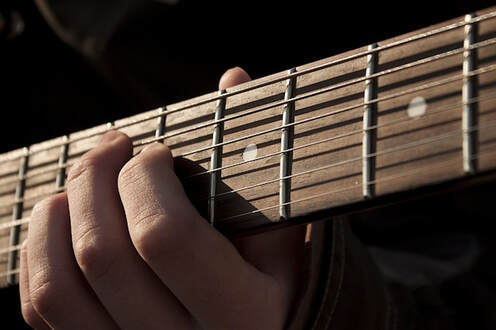Fret
 Do you ever wonder about the origins of the word fret? You don’t? Well, don’t fret about it. No one seems to know the origins of the word.
Do you ever wonder about the origins of the word fret? You don’t? Well, don’t fret about it. No one seems to know the origins of the word.What is a fret? A fret is a ridge on the fingerboard of a guitar or banjo. Guitars usually have from 18 to 24 frets. Acoustic guitars generally having fewer frets than an electric guitar. A banjo usually has 22 frets. Pressing the guitar or banjo strings onto different frets produces different musical sounds.
The word fret first appears in English around 1500, possibly from Old French frete (ring, ferrule). And that is about all that is known about the origins of the word fret.
Having said this, there are many examples of fretted stringed instruments from the ancient world. For example, the remains of a 3rd century CE lute were found in 1907 at an archeological site in Xinjiang, China. Paintings of lutes on the walls of tombs and caves from about 1,500 years ago have been found in other places in China. Images of lutes are to be found in European psalters and books of songs from the same period.
Having said all this, if you do feel the need to fret about something, the verb ‘to fret’ has nothing to do with guitars or banjos or any other musical instrument.
Do you feel a gnawing or tightness in your body when you have something troublesome or problematic on your mind or heart? Do you feel like something is eating away at you? If so, you are likely fretting.
The verb fret comes from Old English fretan (to devour, feed upon, consume) from Proto-Germanic fraetan (to eat up), words which describe the noisy rubbing, scraping, and gnawing sounds which animals, particularly wild animals, make while eating. In the early 15th century, the word fret came to English meaning a gnawing, the wearing or wearying effect of an awareness of wrongdoing, fear, or some other stress. By the 1550s, to fret meant to be worried, to vex oneself.
Reference: Online Etymological Dictionary, https://www.etymonline.com/
Published on February 10, 2022 08:03
No comments have been added yet.



